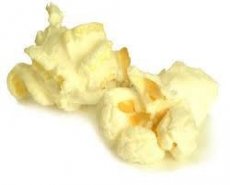Popcorn can cause Alzheimer's disease
Last reviewed: 16.10.2021

All iLive content is medically reviewed or fact checked to ensure as much factual accuracy as possible.
We have strict sourcing guidelines and only link to reputable media sites, academic research institutions and, whenever possible, medically peer reviewed studies. Note that the numbers in parentheses ([1], [2], etc.) are clickable links to these studies.
If you feel that any of our content is inaccurate, out-of-date, or otherwise questionable, please select it and press Ctrl + Enter.

The sweetener contained in airborne corn can be associated with the development of Alzheimer's disease. This conclusion was made by American scientists.
This is an ingredient called diacetyl, which provides corn from the microwave with a characteristic persistent taste. It is used not only in popcorn, but also in other food products. However, it is this sweetener that can be the cause of the development of an incurable progressive disease - Alzheimer's disease.
Director of the Center for the Study of Drugs at the University of Minnesota, Robert Vince, together with colleagues, conducted a study that showed that diacetyl is associated with respiratory illnesses and other health problems in humans in popcorn producing industries, as well as other products with sweeteners. In addition to air corn, diacetyl is used in the production of margarine, various kinds of chips, crackers and other similar snacks, sweets, flour products, animal feeds, beer, certain varieties of wine, etc.
It turned out that the structure of diacetyl is similar to the substances that cause beta-amyloid proteins to stick together among themselves in the human brain. And this congestion is a hallmark of Alzheimer's disease. These studies are published in the journal Chemical Research in Toxicology.
It is proved that diacetyl increases the concentrations of beta-amyloids. And in such harmful industries, constant contact with this sweetener has a toxic effect on the growth of nerve cells, as shown by laboratory experiments. Diacetyl easily penetrates the protective barriers of the brain, which stand in the way of many harmful substances.
 [1]
[1]
